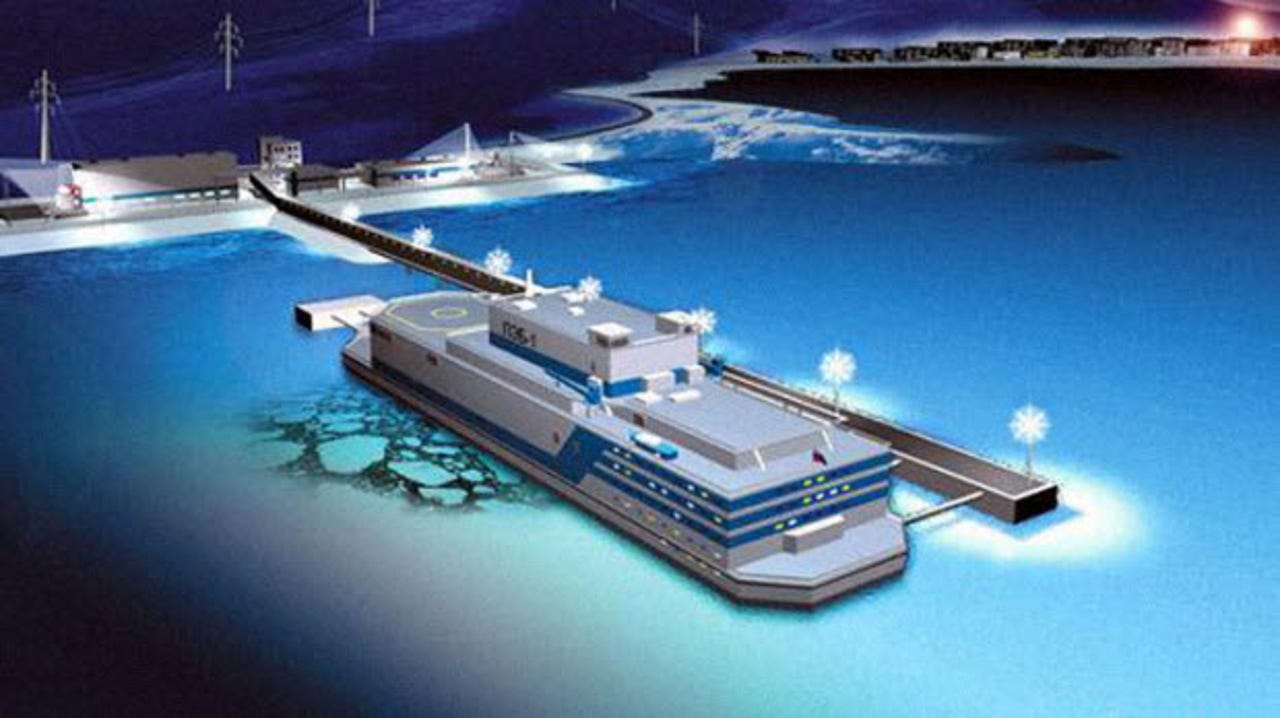Floating Russian nuclear plants: am I the only one who thinks this is a really bad idea?


Let's get one issue out of the way: I am not anti-nuke. I think nuclear will continue to be a comparatively inexpensive, safe and plentiful energy source, and our power needs are not going down.
Given that, let's do a short exercise together. Picture a large barge. Now, stick a nuclear reactor on it. So far, there's nothing much to worry about. Navies around the world have been running nuclear-powered vessels for years and they're surprisingly safe.
Let's take it one step further. Instead of powering the ship, the floating reactor has to power a city. Are you feeling it yet? Do you have that little tingle on the hairs on the back of your neck?
Okay, fine. Let's punch it up. It's a floating Russian nuclear reactor that's supposed to power an entire city. We're talking a floating reactor brought to you by the same people who originally thought Chernobyl was safe.
Apparently, the Russians have wanted to build one of these for years.
I'm also betting that the producers of Bond flicks could build an entire movie around this premise: "See, okay, This evil villian Leonid Arkady has become the head of Spectre and wants to make his own power."
"He doesn't want to be dependent on other countries for power ever again, see, so he's gonna launch this floating nuke plant and then destroy the world and start civilization over, all living off the power of his floating nuke plant."
"Of course, 007 comes in and saves the day. It'll be a blockbuster, I tell you. A blockbuster."
But it's not a movie plot. It's one of those truth is stranger than fiction things.
According to RT.com (which, for the record, is Russia Today — a propaganda arm of the Russian government), the country is getting ready to launch the first of what it hopes will be a fleet of floating nuclear power plants.
The idea is that if power is needed in a part of the country that is lacking a power plant, all that has to be done is float in a spare nuclear generating platform and shoot the energy from ship to shore.
See what I mean? It sounds like a Bond plot, doesn't it?
RT.com reports the first floating bad idea will be launched in 2016. The first platform will not be as much a ship as a barge. It will displace 21,500 tons and will need to be towed into location.
So, yeah, now we have a floating Russian nuclear plant on a leash, being towed around the always-volatile North Sea.
If the train consisting of the floating nuke barge and its transport comrades make it to their destination, it will theoretically be able to pump out 70 megawatts of electricity or 300 megawatts of heat, enough to power a city the size of Yonkers.
RT claims, "The floating nuclear power plants are expected to be used in remote regions of Russia’s high north and Far East, which currently see economic growth suffering from a lack of energy."
So, basically, if something goes very, very wrong, there will be a long wait for help.
This wouldn't be a good Bond film plot if there weren't co-conspirators. Back in the early Bond days, you could picture serious-looking representatives from various nations sitting around a table, plotting their fleet of floating nukes.
Now, however, we'd probably have a scene with Skype open, and each national representatives would be a talking head in a window.
Think this homage to Bond flicks is far-fetched? Nope. RT reports, "15 countries, including China, Indonesia, Malaysia, Algeria, Namibia, Cape Verde and Argentina, have previously expressed interest in acquiring such power stations."
Throughout this column, I've glibly mocked the whole concept of a floating nuclear power plant, when the world's oceans make up the majority of the surface of the planet and we're desperate for new solutions. It's not the idea of pushing technology that worries me. It's the implementation.
Russia is known to have cut corners in nuclear plant protection and while the RT article claims that this floating design is safe, there's one fact that's been haunting me ever since I first read about the Russian scheme.
Apparently construction on the Akademik Lomonosov (the first floating plant) was started in 2007, but stalled for a few years because the project ran out of money. In December, the plant's builders and Russian state company Rosenergoatom inked a financing deal for the project.
What worries me (in addition to everything else) is this: it's a project that's already run out of money once in a country known to cut corners on safety. If one thing is true about building floating nuclear power plants, it's this: you can't cut corners. And yet, this one has run out of cash once. Who knows where the builders are cutting costs to get this thing out of dry dock?
Oh, goody. That makes me feel even safer. Here's hoping 007 is out there somewhere, just waiting for orders to swoop in and save the day.